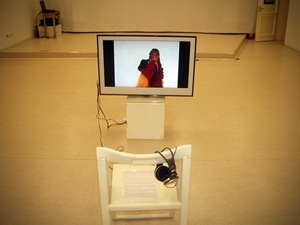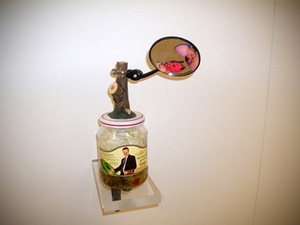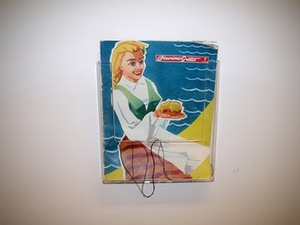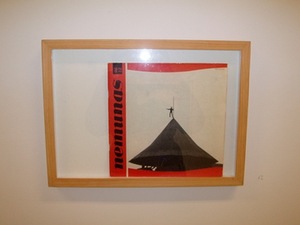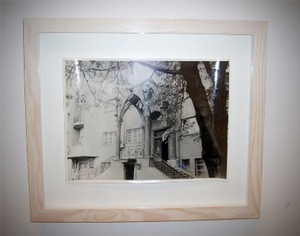A PROVOCATIVE ACTION 0
In brief: Recently both politicians and artists speak about patriotism as the newest trend. For instance, the leitmotif of emigration is very vivid in performances directed by Oskaras Koršunovas. It is hardly surprising that the conceptual artist Dainius Liškevičius too responds to the topic. One of the most recent of his works is the show ‘Without Anger’, displayed at the 101 Art Gallery in Kaunas. It provokes one’s mind and unconscious by raising issues of patriotism, identity and public spirit and stimulating the critique of these phenomena.
In his work D. Liškevičius has been rallying the aesthetics of kitsch, dominating ideologies and popular lifestyle for some time now. The show is focused on Kaunas but also involves broader discourses. The tendency of creating performances, actions, video performances in which he himself participates has been prevailing in his work (‘Vane’ 1996; ‘Imitation of the Everyday’ 1999, ‘Centres of the Wolrd’ 1999, ‘Trilogy of Performances’ 2000, ‘Timer’ 2002, performance at the Arteritorija Gallery 2002). Since 1998 D. Liškevičius created several conceptual installations (‘In / Out’ 1999; ‘If at First You Don‘t Succeed, Try, Try Again’ 2003; ‘High Drama Unexplored Dream’ 2004). Social engagement and society critique dominate in D. Liškevičius‘s work.
The title of the show – ‘Without Anger’ – reminds of the TV show of the same title once hosted by Leonidas Donskis, which aimed to pursue a tolerant and cultured dialogue with society. In the meantime, D. Liškevičius tries to underline a critical outlook at social situations by displaying works with provocative contents.
Thirteen ready-made objects are presented in the show yet the video performance ‘Blot’ becomes its centre of attention. ‘Blot’ illustrates metaphorically, how the national patriotism, perceived through a conscious society and its individuals, may turn civic. Patriotism in its broadest sense is love to one’s nation, language, customs, traditions and many other matters. However, the national patriotism’s conversion to the civic one might raise reverse notions. As J. Girnius asserts, ‘The civic patriotism is understood as respect and pride towards civic institutions. Yet citizens themselves must feel respected by their state in order to be satisfied of its daily life and respect it.’
The video performance ‘Blot’ was created in 2001. The artist wearing a black suit and glasses is smoking a cigarette demonstratively and melting some chocolate with a lighter. Then he smudges his face, neck and hands with the chocolate and starts laughing provocatively. After that the author leaves the room and a ‘new’ Liškevičius comes to his place. The artist is changed by a double. All this reminds of a mini play: the whole life is as if a disguise show, in which everyone has their role. The double makes a mock of the Lithuanian flag: the new Liškevičius rubs his chocolate face with the flag hanging in the background. Our tricolour becomes a ‘Blot’ – a ‘witty’ critique of our daily life.
Other works do not contribute into the common narrative; just accentuate certain events and situations fragmentarily. Twelve objects evoke different sensations and emotions.
Overall, D.Liškevičius’s exhibition ‘Without Anger’ and its means of irony and self-questioning allow us to look at the situation of our state soberly and to examine a critical position of the artist.
